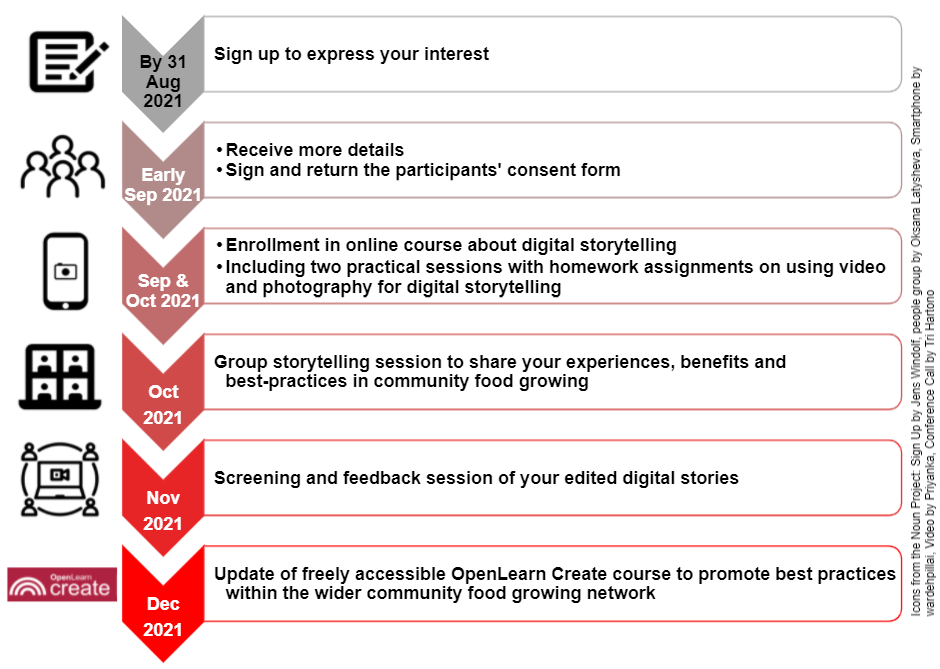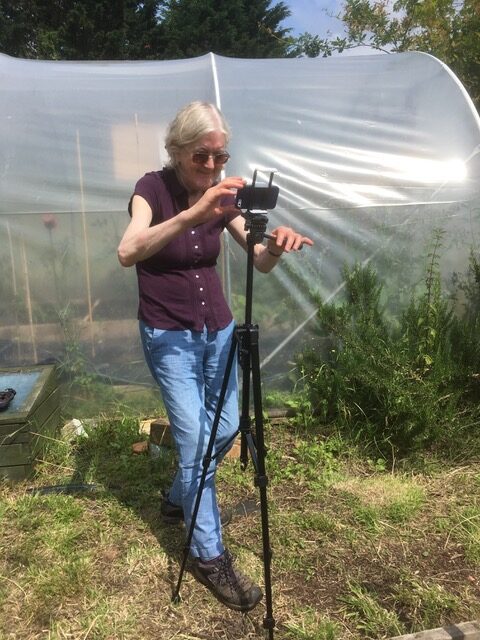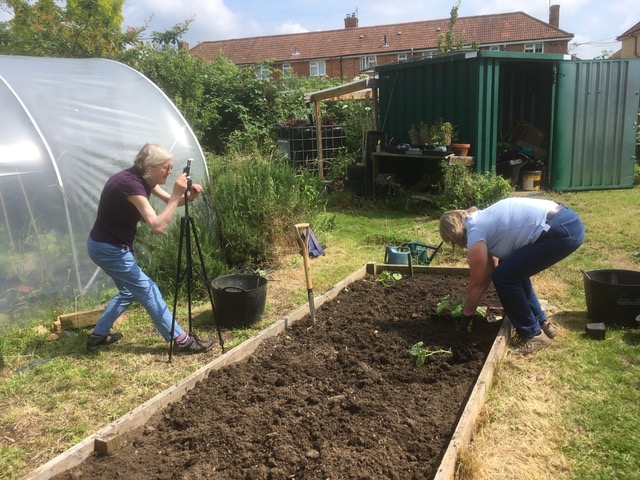Have you experienced benefits in your everyday life through community food growing activities? Would you like to learn how to produce visual stories to share your experiences? Can you help us investigate how community food growing has helped individuals and communities cope with the Covid-19 crisis? Then we want to hear from you!
Starting in September 2021, we are recruiting a second cohort of participants for a collaborative digital-storytelling project organised in partnership with The Open University, Sustain and RISC. The autumn 2021 course will focus on how community food growing has built community resilience, as a potential means to bypass and contest the dominant agro-industrial model of food production. In the course, you will learn how to improve your photographic and videoing techniques, and then edit photo and video material into a compelling, engaging story. You will also learn from other people’s experiences of community food growing and the benefits that have emerged.
To register your interest, complete the expression of interest form here before 31 Aug 2021, the form is also replicated at the bottom of this page. We are limited to a maximum of 25 participants, so we would encourage you to apply as soon as possible in order to secure your place. The course sessions will take place on Saturday mornings and the first two sessions will be held on Sep 11 and 18.

From participants in the spring 2021 course, here are some comments on the benefits from their experience with the course:

"It was valuable to see how the smart phone can be turned into a training package that can be used by NGOs generally and community gardens, especially to build relationship within gardens and improve communications with the wider world. The training puts this into the hands of every gardener and has obvious benefits."
"It was useful and inspiring to discuss the stories in the group."

"I learned a lot about audio-visual skills and ideas on how to put everything together. But I also feel that I already had a lot of skills hiding inside me. And this course helped me to discover myself a bit more. I watch the final video and still can’t believe I did it myself. I feel so proud. This course gave me a new superpower."
The Covid-19 pandemic revealed and intensified stark socio-economic inequalities, especially those due to the globalized, socially unjust, unhealthy agro-industrial food system. This features agrochemical dependence, super-exploited labour and ultra-processed products. When the pandemic initially disrupted this system, elite agendas sought to stabilize and even extend it as a solution for food security.
By contrast with this dominant system, alternative agri-food systems have been transforming food production through agroecological methods which rely on producers’ knowledge for using local biodiverse resources; products are distributed through short supply chains bringing producers closer to consumers, e.g. through farmers’ markets, food banks, weekly food boxes and school meals. These arrangements have been building a new food culture by localizing production-consumption circuits. During the Covid-19 pandemic, such alternatives found greater consumer support and often provided fresh healthy food for vulnerable people.
During the Covid-19 pandemic, there also has been greater interest in community food-growing spaces; these are non-commercial initiatives which depend on volunteer growers and donate the harvest. Participants from such initiatives produced several visual stories exploring diverse initiatives in our spring 2021 course. As these stories show, community food growing has built resilience by several means, for example:
- overcoming numerous obstacles by continuing their food cultivation activities, expanding them through new participants, strengthening cooperative engagements such as supplying food banks, spreading environmentally sustainable practices, and strengthening social bonds.
- building a community which holds, conserves and manages resources in common, strengthening community claims on public cultivation spaces, that would be otherwise squeezed by profit-driven ‘urban regeneration’.
- spreading various collective capacities and skills through inter-generational and inter-cultural learning, in particular: to manage natural resources for food production, to deepen group knowledge of such resources and to overcome potential disruptions with more socially just, resource-conserving practices.
- helped to sustain individual health and wellbeing, and expanded friendship networks and social cohesion. Initial feelings of being powerless were overcome by a sense of shared purpose, serving a greater good, the opportunity to 'make a difference' and empowering individuals and groups with the ability to make a difference, while giving people the opportunity to engage in healthy outdoor physical activities.
Together these benefits of community food growing can be understood as building socio-ecological resilience, a basis for building the future differently. This potential will be further explored in the autumn 2021 course through questions such as these:
- How did your community food growing experience respond to practical difficulties through cooperative modes and environmentally sustainable practices?
- How did participants in your community food growing initiative bring those new skills and capacities to other community spaces?
- What can such initiatives learn from each other?
- How can those capacities facilitate a transformative resilience, towards an alternative agri-food system?
We welcome such stories about your community garden in the autumn 2021 course. Your stories will help to promote community food growing, encourage a greater diversity in participation, share your learning with others, lobby policy-makers to make sure that community food growing is better supported, and crucially, help to transform food growing towards a more local and sustainable practice.
To produce your story through the online course, you will need only access to a smartphone or tablet for the video recording and editing, and approximately 30 hours of your time over a 10 week period.
So, if you are connected to an urban community garden initiative (e.g. as a volunteer, local resident, garden organiser) and want to build your skills on how to create an effective digital story about your initiative’s experience:
Please send your expression of interest by August 31st 2021 via this form.




